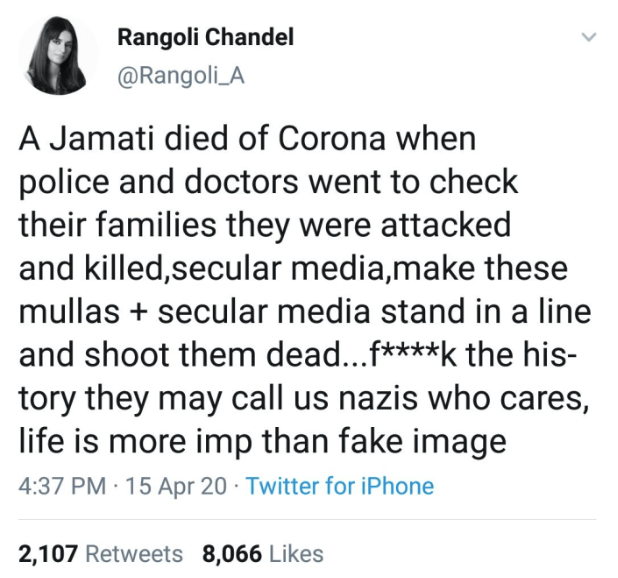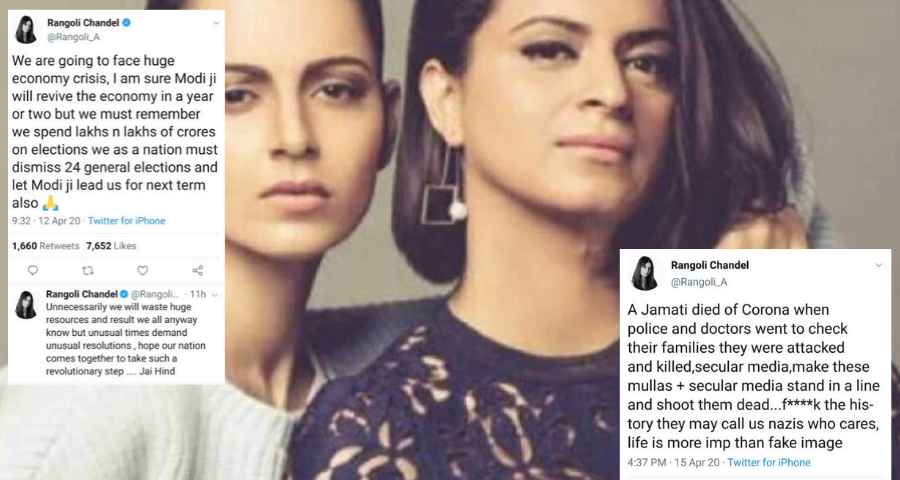On Thursday, Rangoli Chandel’s Twitter account was suspended by the micro-blogging website. The suspension came in the light of a series of problematic tweets from her ‘verified’ account. Chandel and her sister, Kangana Ranaut, hold a massive amount of social capital wherein their stances normalize as well as impact the mindsets of many.
The Tweets
One of the said tweets, apparently about the Uttar Pradesh Moradabad stone-pelting incident, read, “Make these mullas + secular media stand in a line and shoot them dead.” The tweet came under fire by filmmaker Reema Kagti and Farah Ali Khan, who called for Chandel’s account to be reported and suspended. Rangoli Chandel went on in the same tweet to say, “F**k the history they may call us nazis who cares.”

The tweet is blatantly Islamophobic, there are no two ways about it. It specifically targets the religious minority community of Muslims in India. In the current scenario with the COVID pandemic being painted in communal colours as it is, Chandel’s call for “shooting” in the same context becomes excessively problematic. Let alone the fact that explicitly calling for a mass shooting in the first place in itself is dangerous. The tweet can be considered hate speech, given that it fans the flame of divisive lines between religious identities and calls for violence based on a group’s identity.
Additionally, the casual mention and comparison with Nazis, given the obvious history of ethnic cleansing is terrifying. Wherein then, the accusations made by people on Twitter about her explicitly asking for a ‘Muslim Genocide’ does not seem to be far from the truth and is not necessarily a reading between the lines, instead it seems more or less literal. Many also asked for police action, including an individual associated with Tablighi Jamaat, who filed a complaint against Rangoli Chandel and Babita Phogat (who is also facing flak for a tweet) in Maharashtra under Section 153A of Indian Penal Code and the Information Technology Act for spreading hate.

A few days prior to this tweet, Rangoli Chandel had also tweeted asking for a suspension of the 2024 General Elections. As she believed that the resources invested in holding elections would be a ‘waste’ in the post-COVID economic climate, given that the “result anyway we all know.” The tweet says that the current ruling party should ‘lead’ us for another term without being democratically elected. In a democratic setup, it is an obvious fact as to why a celebrity asking for a removal of elections is a dangerous idea.
It would not be a logical leap to call these acts as endorsements of fascism, given that it vouches for an almost dictatorial power and suppression of opposition, by literally taking away the agency of citizens to vote or run for elections. To further spell it out, along with Rangoli, certain websites and Instagram influencers have gone ahead to propose similar calls, citing the emergency powers handed to Hungarian Prime Minister during the pandemic as an example. The debate surrounding free speech is a long one, yet hate and enticement of violence, hiding behind the garb of free speech is unacceptable, especially when the speakers have a lot of influence.
Along with Rangoli, certain websites and Instagram influencers have gone ahead to propose similar calls, citing the emergency powers handed to Hungarian Prime Minister during the pandemic as an example.
Given Rangoli’s social capital, and given that celebrities associated with Bollywood hold an unmatched pedestal, these stances hold copious amounts of power when it comes to shaping culture and thought. With such kind of endorsement, existing problematic ideas find a way to justify and normalise themselves. This leads to the very tangible harm of instances of violence and the undermining of the democratic culture.
After numerous people reported, Rangoli Chandel’s account was suspended. Soon, Kangana Ranaut posted a video defending her sister. The video seemingly justified Rangoli’s stance by saying that she was specifically talking about shooting people who were attacking doctors and that no one asked for a genocide. She goes on to say that, in case a tweet is found asking for one, then both of them would publicly apologise. Yet, this does not justify Chandel categorically using the term ‘mullas’ and also verbatim drawing a comparison to the Nazis.
Additionally, Ranaut’s defence seems to peg the blame of implying all Muslims as ‘terrorists’ on the people who called Chandel out for her tweet, instead of taking responsibility. She goes on to say in the video that websites like Twitter should be shut down and vouches for ‘our own’ social media, and asks the Prime Minister and Home Minister for the same. The video completely shifts the blame from Rangoli Chandel on to Twitter and the users that were offended by the tweets. She ends the video saying ‘Happy Lockdown’ in a cheery manner, in contrast to the grave matter at hand.
Both the sisters have often been seen as ‘feminist icons’ in mainstream media, owing to Ranaut’s movie choices and Chandel being the survivor of an acid attack, a gender-based violent act, and having actively spoken about it.
Yet, they have had a history of bashing and pulling down fellow female artists like Alia Bhatt and Richa Chadha. Ranaut also seems to have a fairly skewed definition of feminism in and of itself, for instance when she went on to say that, “Why should there be equality related to someone’s sex” and “You are as empowered as you think you are.” Additionally, Ranaut allegedly laughed on rape jokes and refused to support Deepika Padukone’s campaign; instead, went on to mock it by calling it ‘Deepika Bachao’ (Save Deepika). Wherein the sisters have also been accused of resorting to the patriarchal bargain.
Celebrities associated with Bollywood hold an unmatched pedestal. Hence, their stances hold copious amounts of power when it comes to shaping culture and thought.
Given, that they still hold the place of being feminists in Bollywood, such stances also make them liable for accountability to the feminist movement. Their brand of feminism, which is evidently not inclusive, is dangerous, especially when intersectionality plays a principle role. Celebrities associated with Bollywood hold an unmatched pedestal. Hence, their stances hold copious amounts of power when it comes to shaping culture and thought. With such kind of endorsement, existing problematic ideas find a way to justify and normalise themselves. This leads to the very tangible harm of instances of violence and the undermining of the democratic culture.
Backlash
While the tweets obviously call for a backlash, the nature of said backlash that she has received is flawed. For instance, Atul Khatri, a comedian, went on to use a casteist slur in an attempt to insult Rangoli Chandel. Not only is this a crime under the Scheduled Caste and Scheduled Tribe (Prevention of Atrocities) Act 1989, but also highlights how no space is devoid of caste discrimination.

Similarly, people on twitter tweeted, hoping for her to be subjected to another acid attack or that she had not ‘learnt’ from the attack she suffered. It uncovers the flawed mentality that there is a lesson to be learnt by an acid attack or a lesson to be taught by the action of it, a problematic narrative that supports gender-based violent acts. One additionally cannot invalidate her experience.
Rangoli Chandel’s stance might be heavily bigoted, but that does not call for casteist and sexist behaviours. Wishing harm upon an individual or using slurs targeting an oppressed community, while defending against calls for violence and slurs against another oppressed community, is highly problematic. Championing for the rights of a community is nullified in such a case.
Also read: Islamophobia In The Times Of A Pandemic
Some came out in support of Rangoli as well, with Sona Mohapatra tweeting “While I might not subscribe to all their views, I also stand by their right to express them.” The debate surrounding free speech is a long and old one, yet hate and enticement of violence, hiding behind the garb of free speech is unacceptable, especially when the speakers have a lot of influence.
With the current political status-quo, stances favouring divisions along communal lines are highly problematic and need to be called out, yet the nature of calls demanding this accountability also needs to be kept in check.
Featured Image Source: Times of India and Twitter
About the author(s)
Surmayi is a writer trying to pen down words with ink made from sunset's colours and a student of Political Science at Miranda House.
She has authored a story in a collection of short stories called Cadence. Her poetry and fiction have been published in several online journals and print anthologies. A blog columnist for Teen Belle Magazine, she has also been a contributor to Medium and a content writer for Reform The Norm.
A raging feminist using writing as her medium.





I’m horrified by people wishing another acid attack on her. Its sick. She does seem to be a narcissist with disturbingly sociopathic tendencies (ticks all the textbook traits of a sociopath)